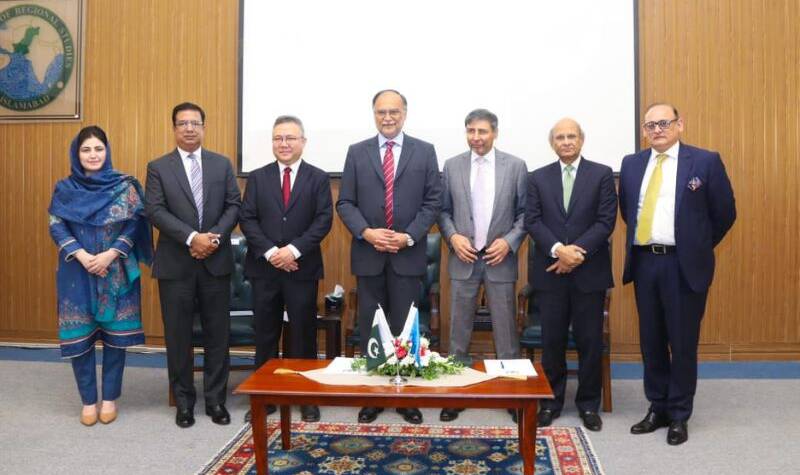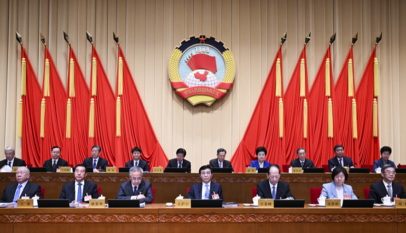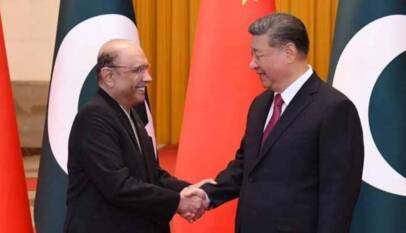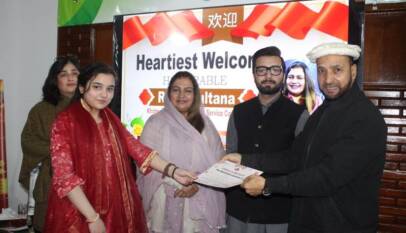Planning Minister Ahsan Iqbal highlights CPEC as a transformative force for Pakistan’s economy
Pakistan’s Planning Minister Ahsan Iqbal emphasized the transformative impact of the China-Pakistan Economic Corridor (CPEC) on Pakistan’s economy, turning it into an attractive investment destination. Speaking at a seminar titled “CPEC 2.0: Prospects and Challenges,” he highlighted the strong China-Pakistan partnership and the focus of CPEC’s second phase on industrial collaboration, regional connectivity, and socioeconomic development. The minister stressed the need for peace, political stability, and policy continuity to ensure CPEC’s success, which promises technological advancements, job creation, and food security. Other speakers, including Chinese officials, underscored CPEC’s role in Pakistan’s growth and the strategic long-term partnership between the two nations.
Pakistan’s Federal Minister for Planning, Development and Special Initiatives, Ahsan Iqbal on Wednesday emphasized that the China-Pakistan Economic Corridor (CPEC) has been a transformative force for Pakistan’s economy, shifting it from the brink of collapse to an attractive investment destination.
A high-profile seminar was organized by the Institute of Regional Studies (IRS) on CPEC and emerging opportunities under the title, “CPEC 2.0: Prospects and Challenges”. Ahsan Iqbal was the Chief Guest on the occasion while Senator Mushahid Hussain Syed along with Minister of the Chinese Embassy in Pakistan, Yang Nuo, eminent economist Dr. Ashfaque Hasan Khan and other distinguished experts comprised the panel at the discussion attended by diplomats, academicians, intelligentsia and researchers.
In his keynote address, the Planning Minister highlighted the strong bond of trust and shared vision between China and Pakistan, which has enabled them to overcome initial challenges. Now, as they enter the second phase of CPEC, the focus will be on industrial collaboration, regional connectivity, and socioeconomic development.
Ahsan Iqbal also asserted that for CPEC to be successful, it is crucial to establish peace, political stability and continuity of policies while demonstrating a continuous commitment to reforms. “CPEC 2.0 aims to enhance technologies, create job opportunities, and ensure food security through agricultural mechanization. As we embark on this journey, it represents a critical opportunity for Pakistan to build a brighter future for generations to come. We must unite as one nation and one team to ensure the success of CPEC 2.0,” the minister said.
Earlier, in his welcoming remarks, Ambassador Jauhar Saleem, President of the IRS, stated that the all-weather strategic cooperative partnership between Pakistan and China had reached new heights with the launch of CPEC 2.0, which focuses on high-quality development, technological innovation, and sustainable growth. “The upgraded vision prioritizes clean energy, IT, and agriculture amongst other things aligning with Pakistan’s 2025 goals and China’s 5Cs framework. CPEC 2.0 offers great opportunities for job creation, youth empowerment, and economic growth, provided security and institutional challenges are addressed to ensure productive investments,” he said.
Mr. Yang Nuo, Minister Counsellor of the Embassy of the People’s Republic of China, delivered special remarks on the CPEC project. He said that the second phase of CPEC is poised to generate new momentum for Pakistan’s development, building on the project’s success over the past 11 years, which has attracted $25 billion in investments and transformed the country’s economic and social landscape. “Chinese President Xi Jinping and Pakistani leaders have reached a consensus on advancing integration and enhancing Pakistan’s economic and social development through the second phase of CPEC. The joint efforts will focus on developing Special Economic Zones (SEZs), accelerating project implementation, and increasing Pakistan’s agricultural exports to China, thereby contributing to both China’s modernization and Pakistan’s growth,” he said.
Senator Mushahid Hussain Sayed stated that the center of power is shifting from the West to the East. China is becoming a scientific super power, contributing 40 percent of research on AI and established top-ranking universities. China’s diplomacy and role in the world has also broadened, he maintained. He noted that China viewed its relationship with Pakistan as a strategic long-term partnership based on mutual trust and cooperation.
Mushahid also discussed attempts by hostile elements to sabotage CPEC through strategies aimed at demonizing, destabilizing, and damaging the initiative. He further stressed that there is a broad national consensus on CPEC in Pakistan, demonstrated by all parties’ unity on June 21 during a meeting with the visiting member of the Communist Party Central Committee Liu Jianchao which reaffirmed strong support for CPEC.
China’s top political advisory body to hold annual session from March 4 to 10
ISLAMABAD, Mar 3 (APP): China’s Two Sessions, the annual gatherings of the National People…













